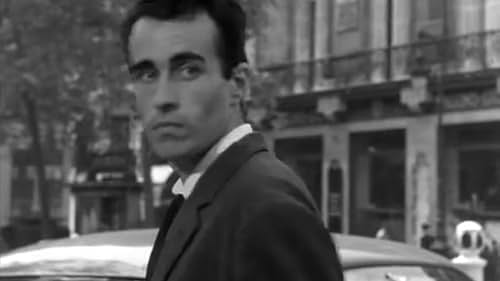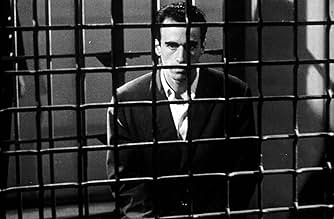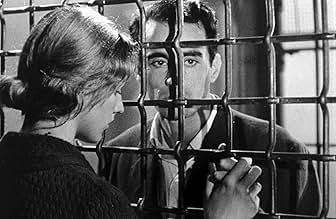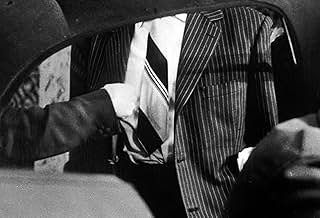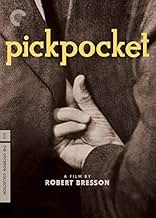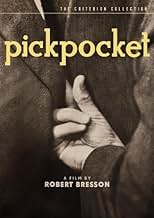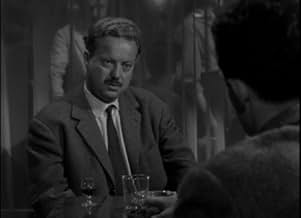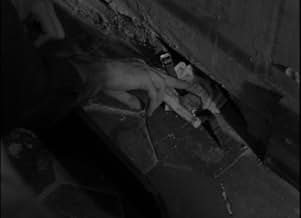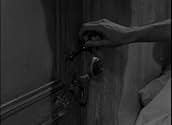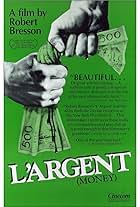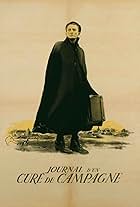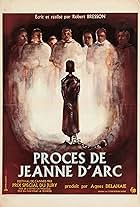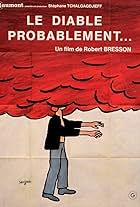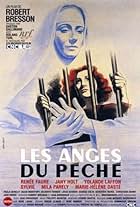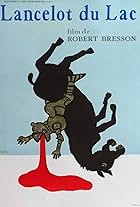Michel passes the time by picking pockets, careful to never be caught despite being watched by the police. His friend Jacques may suspect, while both men may have their eyes on Jeanne, the p... Read allMichel passes the time by picking pockets, careful to never be caught despite being watched by the police. His friend Jacques may suspect, while both men may have their eyes on Jeanne, the pretty neighbor of Michel's ailing mother.Michel passes the time by picking pockets, careful to never be caught despite being watched by the police. His friend Jacques may suspect, while both men may have their eyes on Jeanne, the pretty neighbor of Michel's ailing mother.
- Awards
- 3 nominations total
- Director
- Writer
- All cast & crew
- Production, box office & more at IMDbPro
Featured reviews
Probably the most influential of Robert Bresson's trio of masterpieces from the Fifties (the other two being *A Man Escaped* and, of course, *Diary of a Country Priest*). *Pickpocket* sowed its seeds of influence in the minds of any number of film artists -- Jean-Pierre Melville most notably (who despised Bresson, apparently), whose *Le Samourai* was a mighty struggle against this film . . . and, most completely, writer-director Paul Schrader, who, you'll recall, wrote the *Taxi Driver* screenplay, which was another story about a loner on the outside of societal norms. And it goes without saying that Schrader's *American Gigolo*, which he also directed, is a virtual rewrite of *Pickpocket*, right down to the egregiously plagiarized finale.
The subject of Bresson's film is not nearly as sexy a conception as Schrader's gigolo, though the milieu is equally as sleazy. Instead of preening Richard Gere, we get acting novice Martin LaSalle as the Pickpocket, who wears one suit through the entire film. (Schrader obviously thought he was being clever by giving Gere a large closet stuffed with designer suits). LaSalle lives in a crumbly walk-up flat in Paris, where his books gather dust and the baseboards hide his humble stash of francs and the occasional wristwatch. He has few friends and is too ashamed to visit his dying mother (I won't spoil the reason why). The only pleasure he derives is from his compulsive work as a pickpocket, and it is in these scenes that Bresson stuns us with his martinet control of both narrative pacing and camera placement. The director lovingly shows us the subtle skills of the street thief: the creeping hands, the split-second scams (such as lifting a wallet from a man's suit breast-pocket while standing next to him and pretending to read a newspaper), the choreographed celerity of movement when the thief works with his partners in crime. There's one sequence that follows LaSalle and his two accomplices from a train station all the way to the train, in which they lift about 15 wallets and the occasional purse. The camera-work and editing here is nothing less than sheer mastery -- a ballet of thievery. And let it also be said that Bresson is no slouch when it comes to suspense. It's an intimate and sweaty suspense: will LaSalle's fingers, as they slowly reach into a purse, be noticed?
As might be expected from a French director of the period, there's also plenty of philosophizing to be found here, and in this case, the philosophy is actually pretty interesting. The movie takes as its intellectual parents the ubermensch riff by Nietzsche and Dostoyevsky's "Crime and Punishment". LaSalle asks the cop who's on his trail if society's "supermen", even if they choose to be thieves, should not only be let alone, but even respected as an overall benefit to society. (Thus sprach Kenneth Lay!) Obviously, we can mull that over ourselves, but in the meantime, Bresson is not particularly impressed with the "decent" elements of society. The cop is a pompous blow-hard who can offer LaSalle no alternative to his criminality. Bresson is more or less saying that modern society is contemptible: your acceptance of that thesis, and the importance you place on the occasional 100 francs getting lifted from an overfed bourgeois, will ultimately determine your acceptance of this film.
But perhaps its style will bog you down. As per usual, Bresson breaks virtually every rule of the movies. The use of non-actors in the main roles engenders both assets and liabilities: while the avoidance of the typical actors' nonsense is a definite asset, the liabilities occur when Bresson asks his "interpreters" to finally, well, act. There are a few scenes here where the incompetence of LaSalle (he eventually became a fine actor, but he was virtually plucked off the street by Bresson in 1958) will make you cringe, especially when LaSalle is supposed to be angry with someone. There IS something to be said for professionals -- even professional actors. And if none of this puts you off, perhaps Bresson's perverse narrative style -- including scenes in which a character writes down on a piece of paper the following narrative action, to be followed by the character READING what he has just written down, and climaxed by the character DOING just what he wrote and said he was going to do -- will make you scratch your head and mutter something about the arty pretensions of French directors.
And your comments would certainly be justified in Bresson's later productions. But in *Pickpocket*, I feel, the narrative precision, lack of bloat (the movie is 75 minutes long), and broader philosophical questions coalesce into a stringent masterpiece that must finally win your respect. Besides: you gotta love a movie about a pickpocket who never bothers to lock, or even close, his own front door. See? Bresson can even be funny.
8 stars out of 10.
The subject of Bresson's film is not nearly as sexy a conception as Schrader's gigolo, though the milieu is equally as sleazy. Instead of preening Richard Gere, we get acting novice Martin LaSalle as the Pickpocket, who wears one suit through the entire film. (Schrader obviously thought he was being clever by giving Gere a large closet stuffed with designer suits). LaSalle lives in a crumbly walk-up flat in Paris, where his books gather dust and the baseboards hide his humble stash of francs and the occasional wristwatch. He has few friends and is too ashamed to visit his dying mother (I won't spoil the reason why). The only pleasure he derives is from his compulsive work as a pickpocket, and it is in these scenes that Bresson stuns us with his martinet control of both narrative pacing and camera placement. The director lovingly shows us the subtle skills of the street thief: the creeping hands, the split-second scams (such as lifting a wallet from a man's suit breast-pocket while standing next to him and pretending to read a newspaper), the choreographed celerity of movement when the thief works with his partners in crime. There's one sequence that follows LaSalle and his two accomplices from a train station all the way to the train, in which they lift about 15 wallets and the occasional purse. The camera-work and editing here is nothing less than sheer mastery -- a ballet of thievery. And let it also be said that Bresson is no slouch when it comes to suspense. It's an intimate and sweaty suspense: will LaSalle's fingers, as they slowly reach into a purse, be noticed?
As might be expected from a French director of the period, there's also plenty of philosophizing to be found here, and in this case, the philosophy is actually pretty interesting. The movie takes as its intellectual parents the ubermensch riff by Nietzsche and Dostoyevsky's "Crime and Punishment". LaSalle asks the cop who's on his trail if society's "supermen", even if they choose to be thieves, should not only be let alone, but even respected as an overall benefit to society. (Thus sprach Kenneth Lay!) Obviously, we can mull that over ourselves, but in the meantime, Bresson is not particularly impressed with the "decent" elements of society. The cop is a pompous blow-hard who can offer LaSalle no alternative to his criminality. Bresson is more or less saying that modern society is contemptible: your acceptance of that thesis, and the importance you place on the occasional 100 francs getting lifted from an overfed bourgeois, will ultimately determine your acceptance of this film.
But perhaps its style will bog you down. As per usual, Bresson breaks virtually every rule of the movies. The use of non-actors in the main roles engenders both assets and liabilities: while the avoidance of the typical actors' nonsense is a definite asset, the liabilities occur when Bresson asks his "interpreters" to finally, well, act. There are a few scenes here where the incompetence of LaSalle (he eventually became a fine actor, but he was virtually plucked off the street by Bresson in 1958) will make you cringe, especially when LaSalle is supposed to be angry with someone. There IS something to be said for professionals -- even professional actors. And if none of this puts you off, perhaps Bresson's perverse narrative style -- including scenes in which a character writes down on a piece of paper the following narrative action, to be followed by the character READING what he has just written down, and climaxed by the character DOING just what he wrote and said he was going to do -- will make you scratch your head and mutter something about the arty pretensions of French directors.
And your comments would certainly be justified in Bresson's later productions. But in *Pickpocket*, I feel, the narrative precision, lack of bloat (the movie is 75 minutes long), and broader philosophical questions coalesce into a stringent masterpiece that must finally win your respect. Besides: you gotta love a movie about a pickpocket who never bothers to lock, or even close, his own front door. See? Bresson can even be funny.
8 stars out of 10.
This slow burn film from Robert Bresson is not going to be to everyone's taste, and I'm not sure it was to mine. It's a film I admired more than enjoyed.
It tells the story of a man who's addicted to theft, or maybe more accurately addicted to the rush of getting away with theft, or maybe more accurately addicted to the rush of possibly being caught thieving. It's not a long movie but it may try your patience, as it's very slow and very quiet. The main character is a bit of a blank slate, and he remains so. We never learn much about him, and I personally didn't feel especially invested in what happened to him. It was only in reading about the film after seeing it that I found out the ending is considered to be remarkable among film scholars, but I didn't react to it much myself.
The best scenes in the movie are those that show the elaborate rituals that exist among pickpocket teams, and the pretty amazing feats they pull off. They're like magicians who use sleight of hand for nefarious purposes.
Grade: B+
It tells the story of a man who's addicted to theft, or maybe more accurately addicted to the rush of getting away with theft, or maybe more accurately addicted to the rush of possibly being caught thieving. It's not a long movie but it may try your patience, as it's very slow and very quiet. The main character is a bit of a blank slate, and he remains so. We never learn much about him, and I personally didn't feel especially invested in what happened to him. It was only in reading about the film after seeing it that I found out the ending is considered to be remarkable among film scholars, but I didn't react to it much myself.
The best scenes in the movie are those that show the elaborate rituals that exist among pickpocket teams, and the pretty amazing feats they pull off. They're like magicians who use sleight of hand for nefarious purposes.
Grade: B+
To my previous comments, I should like to add/correct. When I said that Kassagi, who plays "first accomplice" (1er complice), was a 'real-life pickpocket who served as the film's technical consultant' I was not only inaccurate, but the fact that Kassagi was actually a stage magician has some bearing on the film itself, for although the scene in which the pickpockets rip off a series of train passengers is authentic in that it shows how pickpockets operate in terms of teamwork and speed, nevertheless, the moment when Kassagi (?) 'neatly replac[es] the lightened wallet [back] in a man's pocket' is not something a real pickpocket would likely do; it is, however, exactly what a stage magician would do. A real pickpocket has no audience (or so he hopes) whereas a magician wants the audience to see him make a monkey of the hapless "volunteer from the audience." In this case, Kassagi's idea (as I am sure it was) provides a brief moment of comic relief in the middle of a movie that is otherwise without a lot of humor. It is a welcome touch and Bresson was wise to keep it in. Now, I also engaged in a fallacy when I said that 'American pickpockets traditionally prefer to steal from behind to avoid any chance of a mark seeing their faces.' In reality, American pickpockets take from behind because of necessity: even by 1959 when 'Pickpocket" was released, American men more and more carried their wallets in the hip pocket whereas European men, as can be seen in this film, continued to use the inside breast pocket. While the business about seeing the mark's face is part of the lore of American petty criminals, it is not the cause of the American style of picking pockets, but rather a rationalization after the fact.
Robert Bresson's Pickpocket has many great moments, even as it didn't quite do it for me on a first viewing as a 'masterpiece'(some have said to see it twice, perhaps I will). Bresson's use of the camera is often intoxicating in the most subdued, subtle, in-direct distinctions; at times it does take on the prowess of literature. But my only minor nitpick with the film is that it leaves a sort of cold viewing on a viewer, with such simplicity and emotions stripped from the character(s) that it's hard to connect. And yet, this is really made up tenfold with the sort of style that can be likely called Bressonian; straightforward angles, tense medium close-ups, serene editing, and little to no music.
Whatever it sets up for this actor to do, it sets up well. Indeed, the actor who plays the protagonist here is actually very good, aside from the disconnection, and provides an excellent way for us to get along his side. He is a decent person, but there are certain things that get to him, which is why he feels he must steal. At times I almost had a grin as he made some successful grabs, by himself or his cohorts. Was I rooting for him, or just pleased by the pay-off of Bresson's suspense? Maybe both; there is definitely one truly virtuoso sequence in the film, when the pickpockets go on the train.
Like A Man Escaped, there is that sort of dissection, quietly and without really digging too deep, into what a man wants with his life, or doesn't want. While the hero has only one determination in Man Escaped, to get out, Pickpocket has a man who doesn't know what to do with himself, only coming to a genuine catharsis behind bars. I think I like Pickpocket a little more, but I may like it even more on another viewing.
Whatever it sets up for this actor to do, it sets up well. Indeed, the actor who plays the protagonist here is actually very good, aside from the disconnection, and provides an excellent way for us to get along his side. He is a decent person, but there are certain things that get to him, which is why he feels he must steal. At times I almost had a grin as he made some successful grabs, by himself or his cohorts. Was I rooting for him, or just pleased by the pay-off of Bresson's suspense? Maybe both; there is definitely one truly virtuoso sequence in the film, when the pickpockets go on the train.
Like A Man Escaped, there is that sort of dissection, quietly and without really digging too deep, into what a man wants with his life, or doesn't want. While the hero has only one determination in Man Escaped, to get out, Pickpocket has a man who doesn't know what to do with himself, only coming to a genuine catharsis behind bars. I think I like Pickpocket a little more, but I may like it even more on another viewing.
- Do you feel lonely ? -Bresson : very lonely . Very but I don't like it to be lone !!
It would be hard for a regular movie-watcher , some one who just watches for fun , to like the movies made by formalist , strictly stylist director , Robert Bresson . But when we are aware of his elaborate work and subtlety , we admire his skill , undoubtedly .
Pickpocket ( 1959 ) , is one his best and most thoughtful films and has a key role in recognizing both Bresson and his works .
Pickpocket is about an alone and desperate writer who think of himself as a superior to the society ; He thinks he is better than others and believes to be in the right of breaking the rules and neglecting the social Contract .
He defines justice for himself as " some people have the privilege to break the laws , willingly " . He feels humiliated to do regular jobs and thus , begins pocket picking .
And from one of the most basic elements of the story , i.e. main character , there is a gap , a distance , between us ( audience ) and the film . In fact , because of non-naturalistic quality of the plot , we can't sympathize with him ; and what makes him even more distant , is the Bresson's personal touch and fond of "deadpan acting and not showing emotions " . Bresson says himself that " if possible , he prefers to utilize an image , a sound , and any other elements ( and metaphors ) instead of actors " . He wants the actors ( as a matter of fact he uses non-professional actors after his second movie ) to act deliberately and be aware of a witness called camera . In other words he wants them " not to act " .
In this movie , the cast and specially the hero are totally flat and expressionless ; even his walking style is sort of flat . But we can't reject his way of acting ( in fact , not acting ) . There is a deep coldness in this style of performance which makes it surprisingly and paradoxically acceptable and fits well in the world of the movie ; particularly , sympathetic face of the main character which increases contributes in this plausibility .
The cinematography , lighting and playing with shadows and lights in this movie is truly delicate and these factors in addition to a cold open and sort of suspension , forms the idea of a thriller movie . Yes ! Suspension is a key factor here ; and not a regular kind of suspension ; but a Bresson type .
Even , some think that sound editing in this movie , decrease the suspension in some scenes and increase it in some other scenes . For example , in some occasions , a sound or noise , inform us of the occurrence of an incident ; or repeating a sound in another scene can mitigate the effect of suspension . Also there is a scene in which the main character is walking anxiously in a crowded sidewalk ; we can not hear the sounds , the street noise and even the cars ; the only sound is his footsteps , which makes suspension .
It is true that use of music is not considerable in this film , but we can't renounce the sound effects here .
Another point is that Bresson never lets the main character to show fear and anxiety ( unlike Hitchcock who loves to do so ) ; instead he depends on images and sounds to supply the fear : sound of footsteps , images of shaking hands and cold faces ( the opening scene ) , door handle turned quietly and actually anything .
There are some references to" Dostoyevsky's Crime and Punishment" ; like the basic similarities between the heroes : Michel and Raskolnikov who both tend to commit crimes ; both being lonely and isolated and even the hole behind Michel's bed he use to hide the stolen valuable goods ( like Dostoyevsky's hero ) . Knowing these references , is a suspension itself ; some kind of fear .
Yes ! most of the times , we don't have music ; the music remains silent , and waits ; ( something unusual in those days of film-making ) ; yet , this small appearance of music , is fitting and timely . There is no such a thing as spare scenes or excess dialog in this movie ; everything is in its right place and for those who can't comprehend the non- naturalistic structure of the film , and can not accept fears , anxiety , and emotional disturbances of this cold hero , Bresson arranges the famous final scene in which the main character redeems through love ; with music !! Now , let us come back to the QA we had at the beginning of this article ; we see Bresson , lonely like the hero of his film ; self-consciously tries to break the rules ( another kind of rules ) ; and has a style of his own ! And make us to admire his mastership and loneliness !
Storyline
Did you know
- TriviaBanned in Finland until 1965 because of its depiction of authentic pickpocketing techniques.
- ConnectionsEdited into Histoire(s) du cinéma: Une histoire seule (1989)
- SoundtracksSuite de symphonies d'Amadis (selection)
(uncredited)
Music by Jean-Baptiste Lully (as J.B. Lulli)
Éditions Transatlantiques
- How long is Pickpocket?Powered by Alexa
Details
Box office
- Gross worldwide
- $7,541
- Runtime1 hour 16 minutes
- Color
- Aspect ratio
- 1.37 : 1
Contribute to this page
Suggest an edit or add missing content


